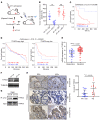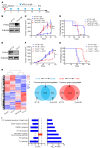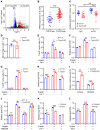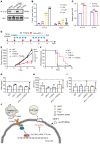TYRO3 induces anti-PD-1/PD-L1 therapy resistance by limiting innate immunity and tumoral ferroptosis
- PMID: 33855973
- PMCID: PMC8262501
- DOI: 10.1172/JCI139434
TYRO3 induces anti-PD-1/PD-L1 therapy resistance by limiting innate immunity and tumoral ferroptosis
Abstract
Immune checkpoint blockade therapy has demonstrated promising clinical outcomes for multiple cancer types. However, the emergence of resistance as well as inadequate biomarkers for patient stratification have largely limited the clinical benefits. Here, we showed that tumors with high TYRO3 expression exhibited anti-programmed cell death protein 1/programmed death ligand 1 (anti-PD-1/PD-L1) resistance in a syngeneic mouse model and in patients who received anti-PD-1/PD-L1 therapy. Mechanistically, TYRO3 inhibited tumor cell ferroptosis triggered by anti-PD-1/PD-L1 and facilitated the development of a protumor microenvironment by reducing the M1/M2 macrophage ratio, resulting in resistance to anti-PD-1/PD-L1 therapy. Inhibition of TYRO3 promoted tumor ferroptosis and sensitized resistant tumors to anti-PD-1 therapy. Collectively, our findings suggest that TYRO3 could serve as a predictive biomarker for patient selection and a promising therapeutic target to overcome anti-PD-1/PD-L1 resistance.
Keywords: Cancer; Cancer immunotherapy; Cell Biology; Immunotherapy; Oncology.
Conflict of interest statement
Figures





References
-
- Hirano F, et al. Blockade of B7-H1 and PD-1 by monoclonal antibodies potentiates cancer therapeutic immunity. Cancer Res. 2005;65(3):1089–1096. - PubMed
Publication types
MeSH terms
Substances
Grants and funding
LinkOut - more resources
Full Text Sources
Other Literature Sources
Medical
Molecular Biology Databases
Research Materials

